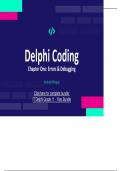Delphi Coding
Chapter One: Errors & Debugging
MathWithMegan
Click here for complete bundle:
IT Delphi Grade 11 - Year Bundle
, Unit 1.1
Types of Errors and Causes
, Syntax Errors
< Notes >
✓ Definition: Syntax errors result from violations of programming language rules, encompassing spelling,
grammar, and punctuation errors.
✓ Impact: Failure to adhere to syntax rules leads to the program not compiling, and corresponding error
messages are displayed.
✓ Prevention: Ensuring adherence to language-specific syntax rules, using semicolons, assignment operators,
and other language-defined constructs correctly.
< Examples >
, Logical Errors
< Notes >
✓ Definition: Logical errors occur when the algorithm used to solve a problem is flawed, resulting in incorrect
program output without compiler detection.
✓ Causes: Logical errors often stem from inadequate planning, improper analysis, or attempts to correct
syntax errors without a thorough understanding of the program's purpose.
✓ Mitigation: Thorough testing with proper planning, and careful analysis before making code modifications
help mitigate logical errors.
< Example >
, Use of Invalid Data
< Notes > < Example >
✓ Principle: The GIGO principle (Garbage In, Garbage Out)
underscores the impact of inaccurate input data on
program accuracy.
✓ Validation Techniques: You can use if statements or
setting input component properties to validate data
✓ Verification: While validation ensures data is within
expected ranges, correctness verification often requires
manual checks against reliable sources like class lists.
, Run-time Errors
< Notes >
✓ Definition: Run-time errors occur during program execution, leading to unexpected crashes or terminations.
✓ Common Causes: Input errors causing type conversion problems, division by zero, attempting to calculate the
square root of a negative value, and overflow errors are highlighted.
✓ Delphi Handling: Delphi handles run-time errors by either terminating the program or displaying an error
message, providing an opportunity for user feedback.
< Example >
,Unit 1.2
Debugging
, Detect logic errors
Single Stepping
< Notes >
✓ Delphi has a feature where you can run each line of code, one by one.
✓ That way you can exactly see where your code went wrong and fix the issues much quicker
✓ You do this, by inserting a ‘breakpoint’
• This will be the point, where when the code reaches this point, the code will stop
• This is how you create a breakpoint (gifs are only playable in the original powerpoint):
✓ To run your code with the breakpoint,
you go to Run then ‘Run To Cursor’ or by
pressing F4
✓ You can then run the next line of code
by pressing Step Over (F8)
, Detect logic errors
Single Stepping
< Notes >
✓ We use ‘watches’ to be able to monitor a variable’s value while we step through the code
✓ Note, if ‘Run to Cursor’ is clicked while the program is paused (because it hit a breakpoint) it will run the
code like normal until another breakpoint is reached (it will then pause the code again)
✓ Video demonstration (only playable in the PowerPoint file):
, Unit 1.3
Error Prevention




